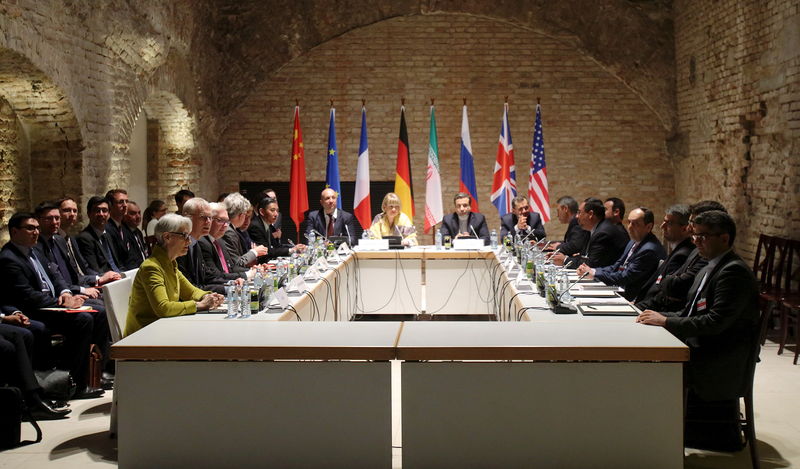By Louis Charbonneau
UNITED NATIONS (Reuters) - Washington wants to be certain that any nuclear deal between Iran and major powers includes the possibility of restoring U.N. sanctions if Tehran breaks the agreement without risking Russian and Chinese vetoes, a senior U.S. official said on Tuesday.
United Nations sanctions and a future mechanism for Iran to buy atomic technology are two core sticking points in talks on a possible nuclear deal on which Tehran and world powers have been struggling to overcome deep divisions in recent days, diplomats said on condition of anonymity.
Negotiators were wrapping up nearly a week of talks in New York on Tuesday, the latest round in 18 months of discussions aimed at clinching a long-term deal by June 30 to curb Iran's nuclear program in exchange for an end to sanctions. Expert-level negotiations are expected to continue for several days.
The current talks have been taking place on the sidelines of a conference on the nuclear Non-Proliferation Treaty. The negotiations between Iran, the United States, Britain, France, Germany, Russia, China and the European Union will resume in Vienna next week.
The latest discussions revolved around a future Security Council resolution that would endorse a deal and render invalid all previous sanctions resolutions, while keeping U.N. bans on ballistic missiles, an arms embargo and some other restrictions.
U.S. and European negotiators want any easing of U.N. sanctions to be automatically reversible - negotiators call this a "snapback" - if Tehran fails to comply with terms of a deal. Russia and China traditionally dislike such automatic measures.
The "snapback" is one of the most important issues for Western governments who fear that, once any U.N. sanctions on Iran are suspended, it could be hard to restore them because Russia and China would veto any such attempt.
U.S. Ambassador to the United Nations Samantha Power made it clear that Washington did not want Russia's and China's recent slew of vetoes on resolutions related to Syria to be repeated with an Iran nuclear agreement.
"We're going to do so in a manner that doesn't require Russian and Chinese support or a vote for snapback ... because we are in a different world in 2015 than we were when the sanctions architecture was put in place," Power said in an interview with Charlie Rose on Bloomberg television.
She offered no details.
Power said Washington hoped the conclusion of a nuclear deal with Tehran would lead to a change in Iran's posture on Syria, where it has supported President Bashar al-Assad in a four-year civil war against rebels seeking to oust him.
PROCUREMENT CHANNEL
Iran's chief negotiator in New York offered a positive assessment of the latest round of nuclear negotiations.
"The atmosphere of the talks was good and it is possible to reach the final deal by June 30," Deputy Foreign Minister Abbas Araqchi told Iranian state television.
However, Western diplomats said on condition of anonymity that Iran and the six powers, who struck an interim agreement on April 2 in Switzerland, were far from agreement due to divisions on sanctions, monitoring and other issues.
Restoring U.S. and EU sanctions is relatively easy, but that is not the case with U.N. sanctions. While the United States is worried about Russia and China, Moscow, Beijing and Tehran want to be certain that Washington cannot unilaterally force a snapback if the Republicans win the U.S. presidency in 2016.
"We haven't found a mechanism that works for everyone yet," one diplomat said.
Another difficult issue is the "procurement channel" - a mechanism for approving Iranian purchases of sensitive atomic technology currently banned under U.N. sanctions. One idea under consideration is a vetting committee that would include Iran and the six powers. Tehran would have a say but not a veto, diplomats said.
Iran says its nuclear program is entirely peaceful and rejects allegations from Western countries and their allies that it wants the capability to produce atomic weapons. It says all sanctions are illegal and works hard to circumvent them.

A confidential report by a U.N. Panel of Experts, obtained by Reuters last week, said Britain had informed it of an active Iranian nuclear procurement network linked to two blacklisted companies.